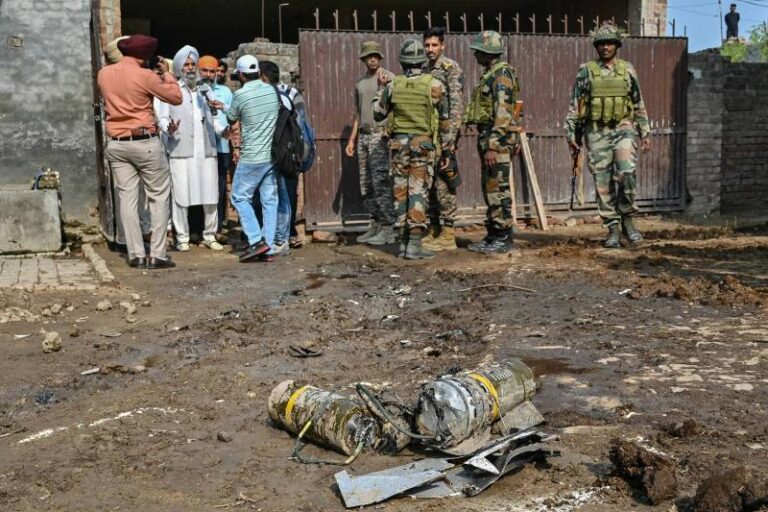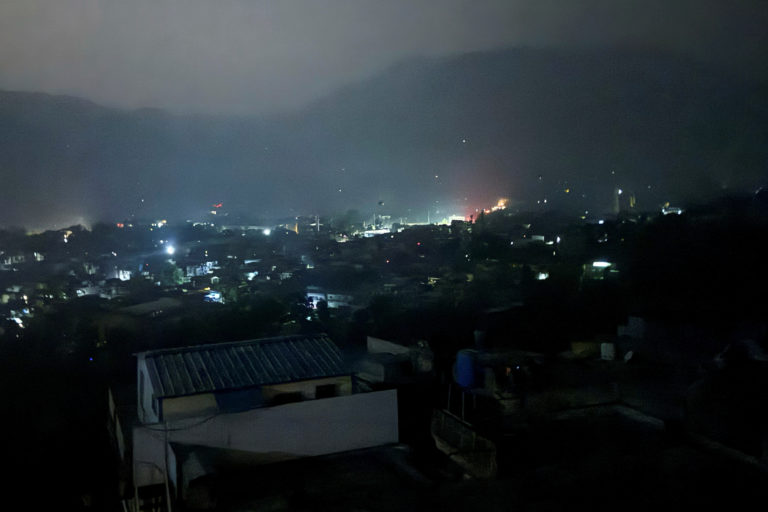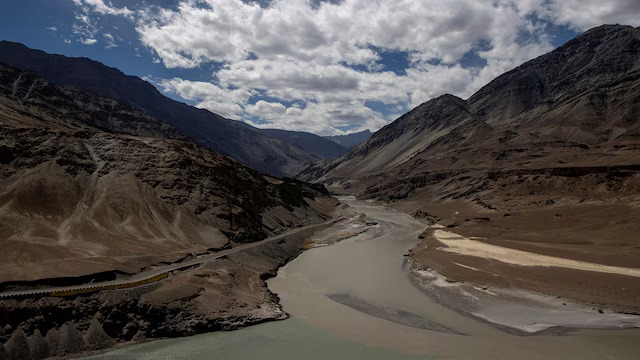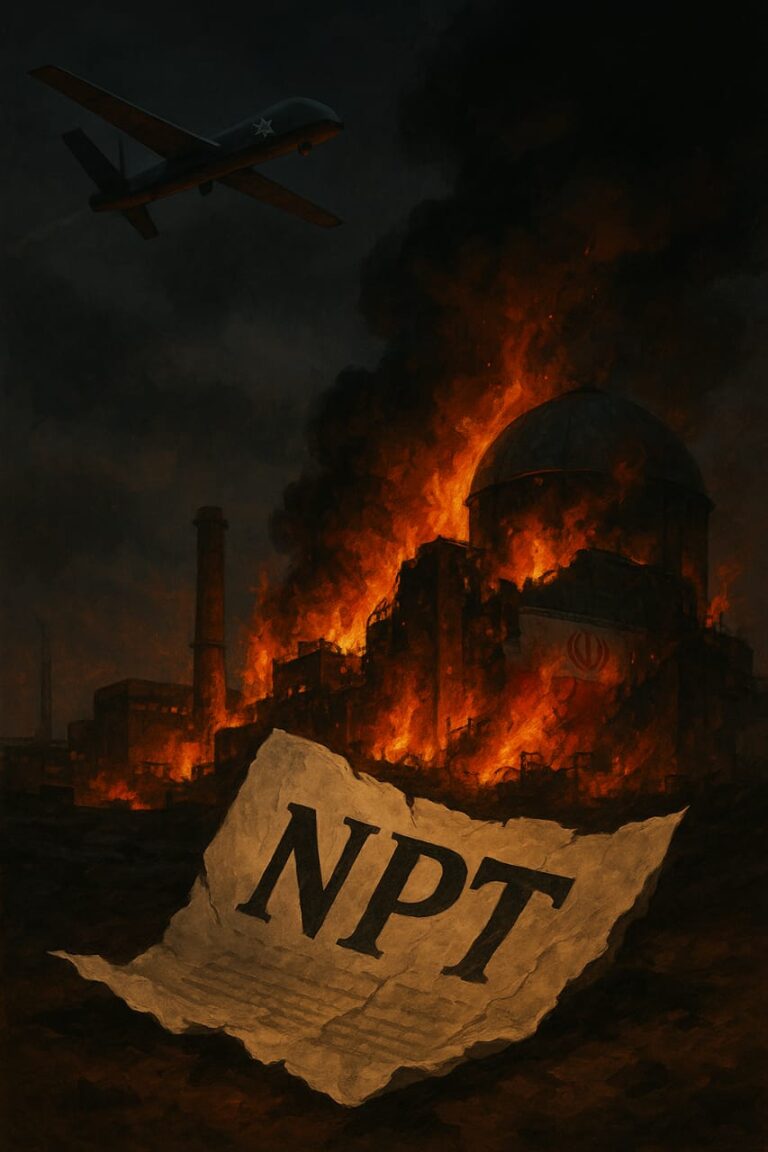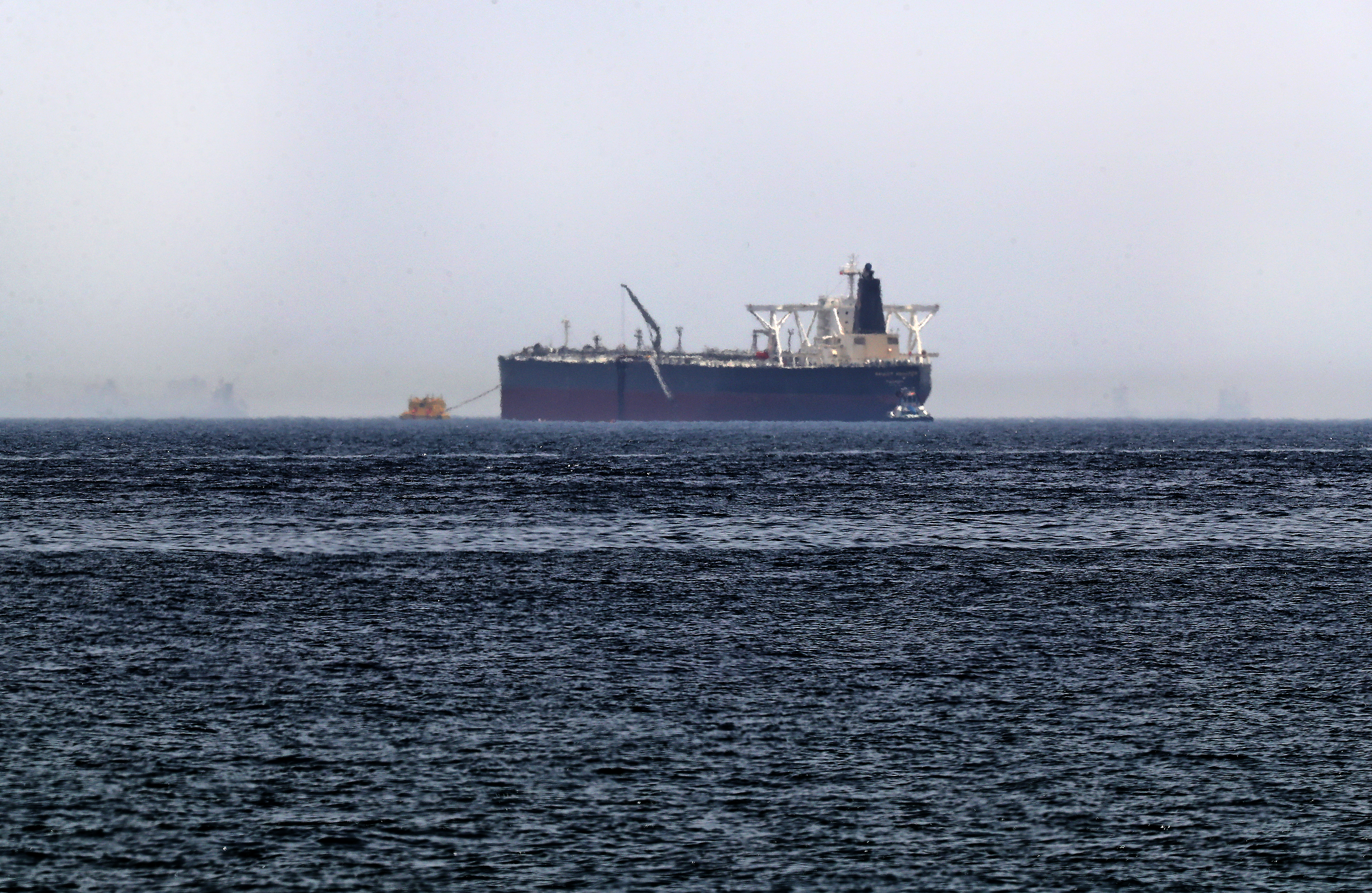
A picture taken on May 13, 2019, shows the crude oil tanker, Amjad, which was one of two Saudi tankers that were reportedly damaged in mysterious "sabotage attacks", off the coast of the Gulf emirate of Fujairah. - Saudi Arabia said two of its oil tankers were damaged in mysterious "sabotage attacks" in the Gulf as tensions soared in a region already shaken by a standoff between the United States and Iran. (Photo by KARIM SAHIB / AFP)
Ahmed Quraishi
On the morning of May 16th, the world woke up to a Saudi newspaper editorial calling for a “calculated surgical airstrike” against Iran.
The Arab News editorial was blunt. “In the considered view of this newspaper, there has to be deterrent and punitive action in order for Iran to know that no sinister act will go unpunished; that action, in our opinion, should be a calculated surgical strike,” the editorial concluded.
Just as a reminder, when this chilling editorial was published, clouds of war hung on both sides of the Strait of Hormuz waterway.
Four days earlier, on May 11, terrorists attacked the only five-star hotel in Gwadar port, the crown jewel of Pakistan’s regional connectivity project, linking China to the Arabian Sea and the Gulf. As Pakistani special forces cleared up the hotel and eliminated the last holed-up attackers in the early hours of May 12, another more serious attack hit another port, Fujairah, about 606 kilometers (376 miles) across from Gwadar in the Arabian Sea, closer to the vital energy trade route.
Two days later, May 14, Houthi drones attacked an oil pipeline inside Saudi Arabia.
All three attacks were sophisticated, military-level operations, and smoothly executed considering timing and geography.
Pakistan played down the May 11 attack in Gwadar.
The United Arab Emirates also kept largely quiet on the May 12 attack, letting international reactions develop.
Saudi Arabia, however, rang international alarm bells on the May 14th attack. The Arab News editorial was taken as Riyadh’s final call for war against Iran.
Understanding whether the Saudis really want war is important because the answer can impact the policies of many countries in the region, not least for Washington, which would need political and financial support from allies like Riyadh if it were to mount military action against Iran.
So, how much the Saudis really want war? Do they really think a war would settle the Iranian problem? And does the Arab News editorial confirm elite thinking in the Saudi capital indicating that Riyadh will join a US-led coalition waging war against Iran?
A first look can be misleading. There is little doubt the Saudis have reached the conclusion that forty years of trying to establish a working relationship with the clerics in power in Tehran has failed. But there is a wide difference on how to deal with it. The pro-war editorial is significant, but it does not reflect the range of opinion on Iran in Saudi decision-making circles. Here is an inside look.
SAUDI OPINIONS ON WAR
On the same day, the Arab News called for calculated surgical strikes against Iran, another influential Saudi paper, Okaz, published an editorial by Saudi writer Khaled Al-Solaiman with a blunt headline, “No To War.”
Al-Sulaiman argued that “no sane person can want war” and that some display of military power is enough to show Iran that blocking oil shipments through Hormuz or attacking American and allied bases in the region would invite a decisive military response. Saudi Arabia has two options, he concluded:
“Either a destructive war that the entire region will pay a heavy price for a while already burdened by the debts of earlier crises. Or unrelenting military deterrence and a choking economic siege that can lead to fresh negotiations that remove the threat of a nuclear program and contain Iranian influence in the region.”
Al-Sulaiman’s basic argument has a lot of Saudi backers. This argument brushes war aside and focuses on using diplomatic options to end Iran’s nuclear ambitions and limit Iran’s footprint beyond its borders.
Next day, May 17, a Saudi analyst for the influential Alhayat newspaper offered another take on how Riyadh should deal with the America-Iran tussle. And he clearly opposed war.

Saud Al-Rayes, editor-in-chief at Alhayat’s Saudi edition, a paper published in multiple cities across the Middle East, cautioned against a war based on disputable evidence. There was no evidence of Iranian involvement in Fujairah oil tanker sabotage, and the drone attack on Saudi Arabia involved Houthis in Yemen. Iran is involved in some ways, he quickly added, arguing that Iranian marine commandos could have sabotaged the four oil tankers, though he underlined there is no evidence yet to confirm this, and that Houthis did not have the “intelligence, planning, and timing skills” to attack deep inside the kingdom without expert support from Iran’s Islamic Revolutionary Guard Corps (IRGC) or from Lebanon-based and region-wide operating Hezbollah. But Iran can always distance itself from these attacks by blaming Houthis. More interestingly, Al-Rayes says Fujairah-type attacks can be prevented through better surveillance, and Houthi drones do not represent a major threat, and these provocations are not serious enough to warrant war. He insists that these actions are not acts of war but an attempt to establish a pattern that Iran intends to pursue to keep everyone busy short of war and buy time until Trump is ousted, or America is exhausted.
Al-Rayes argued that Riyadh’s strategy should be based on the understanding that Tehran will avoid war at all costs and focus on indirect actions, such as the use of proxies for attacks like Fujairah, and wait out the sanctions for two years until President Trump is hopefully ousted in midterm elections in the United States.
The above two samples of Saudi strategic thinking from two very influential Arabic-language newspapers that oppose war and focus on diplomatic means to change Iran’s behavior contrast sharply with one strain in public debate that favors military action.
The arguments in the pro-war camp cannot be discounted either.
This excerpt from the editorial on surgical strikes against Iran lays out strong reasons for war:
“We argue this because it is clear that sanctions are not sending the right message. If the Iranian regime were not too used to getting away with their crimes, they would have taken up the offer from President Trump to get on the phone and call him in order to reach a deal that would be in the best interests of the Iranian people themselves […] We are in 2019 and Iran continues to wreak havoc in the region, both directly and through its well-armed proxies. Crown Prince Mohammed was therefore clearly correct when he argued that appeasement does not work with the Iranian regime, just as it did not work with Hitler.”
The Arab News editorial board concludes by saying that “war is always the last resort” but that “The US strikes worked well when Assad used chemical weapons against his people.”
Another interesting article that gives a good insight into Gulf thinking on war with Iran comes from Dahem Al-Qahtani, a policy adviser at Al-Qabas newspaper of Kuwait, an influential Arab nationalist paper in the region since half-century.
Qahtani is antiwar and has repeatedly argued over the months that war with Iran is not good for Gulf states, preferring diplomatic and economic pressure to bring Iran to the table.
In his June 1st opinion piece, Qahtani responded to the Iranian Foreign Minister Javad Zarif’s offer of a non-aggression pact between Iran and Gulf Arab states. Qahtani titled his Arabic article in Farsi, ‘Mr. Zarif, We Are Not Naïve’ (Ya Sayyid Zarif, Ma Saada Loh Neestam). Qahtani’s main concern is not a war against Iran, which he firmly opposes. He is more worried about what he sees as Tehran’s insincerity in seeking a non-aggression pact with Arabs, which otherwise would be a great idea. His article is centered around Iran’s efforts to manage and control conflicts with neighbors like Turkey, Pakistan, and Azerbaijan while fomenting tension on the ground in the Gulf. Hence his Farsi refrain, ‘we are not naïve.’
‘WAR & TALKS’ LOBBIES
Inside Saudi Arabia, the dominant foreign policy school on relations with Iran emphasized talks and engagement with the clerics who seized power in Tehran after 1979. This school steered the Saudi policy on Iran for most of the past four decades. This school’s argument was that Riyadh enjoyed good relations with Iran under the Pahlavi dynasty and that Riyadh can replicate this with Iranian mullahs who replaced the Shah. According to this Saudi school, the Khomeinist school of Iranian clerical system was a new entrant in Iran’s politics and needed time to transform from a revolution to a state, and that Khomeinists deserve to be given time for moderate elements in the movement to emerge and stabilize the state. Hence, moderate Khomeinists in Iran must be engaged despite provocations of exporting the revolution and seizing holy sites, the Saudi concluded.
Under this policy, the 1990s was a remarkable decade in that Iran’s ruling clerics reached out to Arabs and normalized relations. The credit for this goes to President Khatami of Iran and King Abdullah of Saudi Arabia. And to some extent to presidents Ahmadinejad and Hashemi Rafsanjani. All of them visited Riyadh. Two of them – Khatami and Nejad – received a red-carpet, sword-dance welcome in the Saudi capital. Hezbollah, an Iranian proxy in Lebanon, became heroes in Arab media. And Arab cultural and political delegations made a beeline to Tehran, Isfahan, Shiraz, and Mashhad. The old suspicions about Iran’s revolutionaries wanting to export the revolution and topple governments across the region were gone and were replaced by normalcy like the one that existed before 1979.
This thinking dominated Gulf policy until 2015. Things changed after that year when clerics in Tehran celebrated a proxy militia’s takeover of Yemen and launching of war with neighboring Saudi Arabia and Gulf states with explicit religious undertones, such as seizing the holy cities of Makkah and Madinah.
While 2015 was a watershed, the downward spiral began in 2003, when pro-Iran militias swept Iraq, then Syria. Hezbollah was firmly entrenched in Lebanon and appeared to be grooming local branches across other Arab countries (which later led to a spate of expulsions of Iranian diplomats from several Arab capitals, and some Muslim capitals, all accused of creating local Hezbollah-style militias.) By this time, architects of Iran’s successful normalization policy, like Khatami and Rafsanjani, were sidelined and put in house arrests, and Tehran appeared to have been taken over again by hardliners bent on ‘exporting the revolution’ and shaking governments in the region.
The dominant Saudi thinking today is convinced that Iran under the clerics will continue to meddle in the region and there is little hope in moderating the behavior of the ruling clergy in Tehran through engagement and that it is better to side with the Iranian people while taking steps to reduce Iran’s footprint across the region and push the genie back inside Iran’s borders.
There is a consensus on this conclusion across the Gulf region and most of the Arab countries. The only difference is in the next steps: war or talks.
The military option appears to have more currency within some circles of the Saudi government. And, as is expected, Saudi diplomats and military officials are more circumspect when it comes to war. There is a large constituency within the Saudi royal family and the elites that favor diplomatic and economic coercion to getting involved in a U.S.-Iran war.
The objective is not war but to convince Iran to change its forty-year-old policy of exporting militancy and revolution.
IRAN-GULF RECONCILIATION
Despite differences on whether to talk to Iran or join a war against it, one point that unites hawks and doves in the Gulf and the wider Arab region is that Iran needs to change. Everyone agrees that Iran’s ruling clergy cannot continue behaving like it still is 1979 and that ‘exporting the revolution’ and breeding region-wide militias is unacceptable. And that it is up to Tehran to decide whether this change should come through diplomacy or war.
Many Iranian exiles live in several Gulf states, including the UAE, Oman, Qatar, and Kuwait. Dubai is a hub, where both Iranians opposed to Tehran and supportive of the government live and do business. Saudi Arabia receives large numbers of Iranian pilgrims living worldwide, outside Iran. Unlike pilgrims coming from Iran in government-controlled groups, overseas Iranians interact freely with the Saudis in Jeddah, Makkah, and Madinah. Many young Saudis have learned Farsi and are now guides who help Iranian visitors and pilgrims. Dr. Mohamed Al-Sulami, a young Saudi academic who studied at Tehran University, became a hit on Iranian social media in 2017 when he released a video message in Farsi to Iran’s youth conveying love and respect to Iranian people and blaming the government in Tehran of being an obstacle to Saudi-Iranian rapprochement.
Most visitors to Iran, Saudi Arabia, and Gulf states, who mingle with ordinary folks in these places, agree that nobody wants war. Also, it is crucial to understand that notions of Arab-Persian and Shia-Sunni rivalries are exaggerated in the media. While sectarian extremists on the fringes of society exist in Saudi Arabia, Iran, and elsewhere in the region, mainstream Saudis and Iranians hardly entertain these notions. Forty years of sectarian literature and mobilization across the region has probably made many forget that such zealotry did not exist before 1979.
Today, political wrangling between governments in the region over extremism, militias, proxy warfare and destabilization is a strategic debate, not sectarian. A sect is a convenient tool for warfare, not the war itself.
Ahmed Quraishi is a Senior Research Fellow at Project for Pakistan in 21st Century, a private research group based in Islamabad

